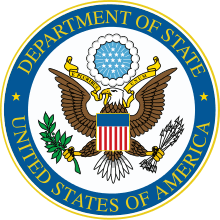United States Ambassador to South Sudan
| Ambassador of the United States to South Sudan | |
|---|---|
|
Seal of the United States Department of State | |
| Nominator | Barack Obama |
| Inaugural holder |
Susan Page as Ambassador |
| Formation | July 9, 2011 |
| Website | U.S. Embassy – Juba |
The United States Ambassador to South Sudan is the official representative of the President of the United States to the head of state of the Republic of South Sudan.
The government of the United States recognized South Sudan on its independence day, July 9, 2011.[1][2] On the same day, the existing U.S. consulate (accredited to the Republic of Sudan) in the capital Juba was upgraded to embassy.[3] R. Barrie Walkley, the U.S. Consul General in Juba was appointed to serve as Chargé d'Affaires pending the appointment of a U.S. Ambassador to Juba.[1]
On August 18, 2011, President Obama announced his intention to nominate Susan D. Page to be the first U.S. Ambassador to South Sudan.[4][5] Page served in her role as U.S. Ambassador to South Sudan from October 2011 through July 2015. The current U.S. Ambassador to South Sudan is Mary Catherine Phee.
Chiefs of mission
U.S. diplomatic terms
After 1915, The United States Department of State began classifying ambassadors as career Foreign Service Officers (FSOs) for those who have served in the Foreign Service for a specified amount of time.
Political appointee
A person who is not a career foreign service officer, but is appointed by the president (often as a reward to political friends).
Appointed
The date that the ambassador took the oath of office; also known as “commissioning”. It follows confirmation of a presidential appointment by the Senate, or a Congressional-recess appointment by the president. In the case of a recess appointment, the ambassador requires subsequent confirmation by the Senate.
Presented credentials
The date that the ambassador presented his letter of credence to the head of state or appropriate authority of the receiving nation. At this time the ambassador officially becomes the representative of his country. This would normally occur a short time after the ambassador’s arrival on station. The host nation may reject the ambassador by not receiving the ambassador’s letter, but this occurs only rarely.
Terminated mission
Usually the date that the ambassador left the country. In some cases a letter of recall is presented, ending the ambassador’s commission, either as a means of diplomatic protest or because the diplomat is being reassigned elsewhere and replaced by another envoy.
Chargé d'affaires
The person in charge of the business of the embassy when there is no ambassador commissioned to the host country. See chargé d'affaires.
Ad interim
Latin phrase meaning "for the time being", "in the meantime". See ad interim.
- Barrie Walkley – Career FSO
- Title: Chargé d'Affaires
- Appointed: July 9, 2011
- Terminated mission: December 6, 2011
- Susan Page – Career FSO
- Title: Ambassador
- Appointed: December 6, 2011
- Terminated mission: July 2015
- Mary Catherine Phee - Career FSO
- Title: Ambassador
- Appointed: July 15, 2015
- Terminated mission: Current
See also
- Embassy of the United States, Juba
- South Sudan-United States relations
- Foreign relations of South Sudan
- Ambassadors of the United States
References
- 1 2 "U.S. Recognizes Republic of South Sudan As Sovereign, Independent State". United States Department of State. Retrieved 2011-07-09.
- ↑ "Statement of President Barack Obama Recognition of the Republic of South Sudan". U.S. White House. Retrieved 2011-07-09.
- ↑ "Briefing on the New Republic of South Sudan". United States Department of State. Retrieved 2011-07-09.
- ↑ "President Obama Announces More Key Administration Posts". The White House, Office of the Press Secretary. August 18, 2011. Retrieved August 18, 2011.
- ↑ "South Sudan envoy unveiled". Politico. August 18, 2011. Retrieved August 18, 2011.
 This article incorporates public domain material from the United States Department of State website http://www.state.gov/r/pa/ei/bgn/index.htm (Background Notes).
This article incorporates public domain material from the United States Department of State website http://www.state.gov/r/pa/ei/bgn/index.htm (Background Notes).
External links

